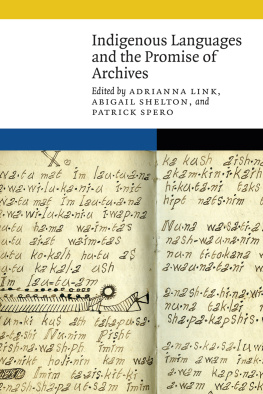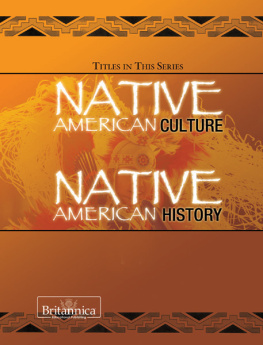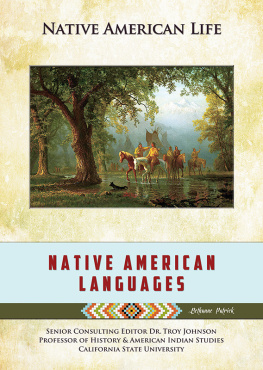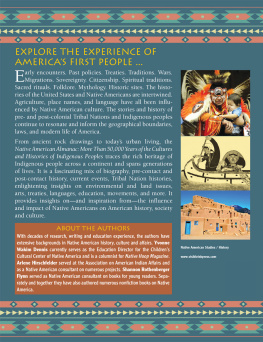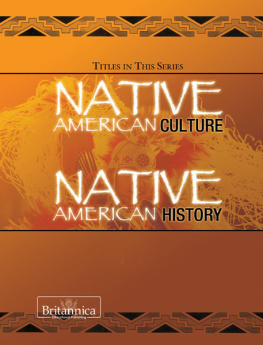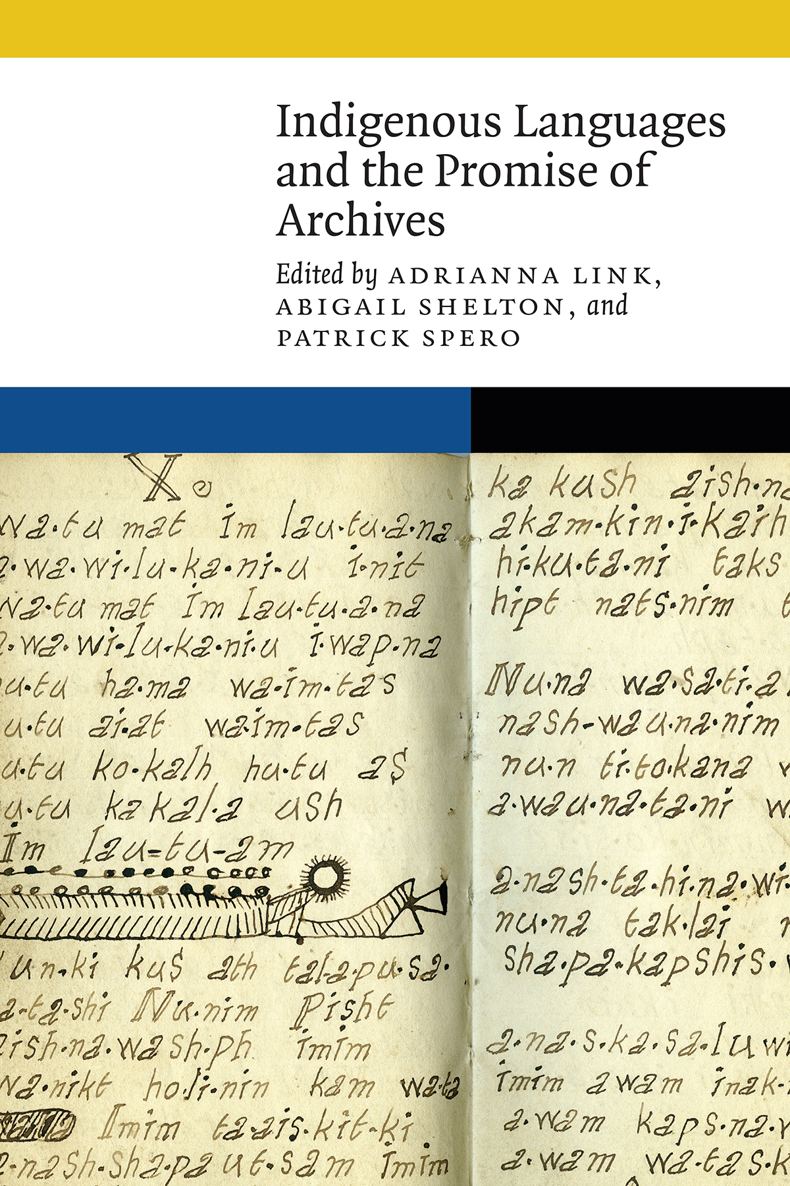
This collection is an important contribution to the area of decolonial thinking as it relates to archives, writing studies, power, and language. Its audiences include scholars across a range of disciplines and education leaders in tribal communities.
Ellen Cushman, author of The Cherokee Syllabary: Writing the Peoples Perseverance
New Visions in Native American and Indigenous Studies
Series Editors
Margaret D. Jacobs
Robert J. Miller
Indigenous Languages and the Promise of Archives
Edited by Adrianna Link, Abigail Shelton, and Patrick Spero
Co-published by the University of Nebraska Press and the American Philosophical Society
2021 by the Board of Regents of the University of Nebraska
Cover designed by University of Nebraska Press; cover image is from the interior.
All rights reserved.
Library of Congress Cataloging-in-Publication Data
Names: Translating across Time and Space: Endangered Languages, Cultural Revitalization, and the Work of History (Symposium), (2016: Philadelphia, Pa.) | Link, Adrianna, editor. | Shelton, Abigail, editor. | Spero, Patrick, editor. | Center for Native American and Indigenous Research sponsoring body. | American Philosophical Society sponsoring body.
Title: Indigenous languages and the promise of archives / edited by Adrianna Link, Abigail Shelton, and Patrick Spero. Description: [Lincoln]: Co-published by the University of Nebraska Press and the American Philosophical Society, 2021. | Series: New visions in Native American and indigenous studies | Papers presented at the symposium, Translating across Time and Space: Endangered Languages, Cultural Revitalization, and the Work of History, hosted by the Center for Native American and Indigenous Research ( CNAIR ) at the American Philosophical Society in Philadelphia, from October 13-15, 2016. | Includes bibliographical references and index. | Summary: Explores new applications of the American Philosophical Societys Library materials as twenty-first century scholars seek to partner on collaborative projects, often through the application of digital technologies, that assist ongoing efforts at cultural and linguistic revitalization movements within Native communities Provided by publisher.
Identifiers: LCCN 2020040354
ISBN 9781496224330 (hardback)
ISBN 9781496224620 (paperback)
ISBN 9781496225184 (epub)
ISBN 9781496225207 (pdf)
Subjects: LCSH : Indians of North AmericaLanguagesCongresses. | Language revivalUnited StatesCongresses. | Language revivalCanadaCongresses. | Indians of North AmericaArchivesCongresses. | Indians of North AmericaLibrary resourcesCongresses.
Classification: LCC PM206 .T73 2016 | DDC 497dc23
LC record available at https://lccn.loc.gov/2020040354
The publisher does not have any control over and does not assume any responsibility for author or third-party websites or their content.
Contents
Regna Darnell
Commentary by Robert J. Miller
Jane Anderson and James E. Francis Sr.
Richard A. Grounds
Lisa Conathan
Commentary by Bethany Wiggin
Jennifer Carpenter, Annie Guerin, Michelle Kaczmarek, Gerry Lawson, Kim Lawson, Lisa P. Nathan, Mark Turin
Jeffrey Davis
Commentary by Diana E. Marsh
Sean P. Harvey
Anne Keary
Gwen N. Westerman and Glenn M. Wasicuna
Commentary by Michael Silverstein
Sarah Carmen Moritz
Bernard C. Perley, Margaret Ann Noodin, and Cary Miller
Commentary by Regna Darnell
Sara Snyder Hopkins
Kayla Begay, Justin Spence, and Cheryl Tuttle
Commentary by Jennifer R. ONeal
Gwyneira Isaac
Craig Mishler and Kenneth Frank
Mary S. Linn
Figures
Tables
Brian Carpenter
The American Philosophical Society ( APS ), located in Philadelphia, resides in the broader region of Lenapehoking, the homelands of past, present, and future generations of the Lenape people. Since its founding in 1743, the APS has benefited from its occupation of this Lenape land. One of the main ways it has done so is in availing itself of the areas long-standing use as a meeting ground and place of exchange for people from many Native nations. This tradition began long before the arrival of European settlers, continued through the early colonial periods (when the APS got started), and continues to this day in gatherings such as the one that brought together the chapters in this volume.
On October 1315, 2016, the Center for Native American and Indigenous Research ( CNAIR ) at the APS hosted Translating across Time and Space: Endangered Languages, Cultural Revitalization, and the Work of History, a symposium that drew together university- and Indigenous communitybased scholars in multiple areas of expertise, including Indigenous-language speakers, activists, and teachers, from throughout North America. The symposiums themes centered on the reclamation, preservation, and restoration of Indigenous languages, both historically and in the present day; practices surrounding translation and translators over the last five centuries; the work of language and cultural revitalization; and models for collaboration in all of these areas. The symposium coincided with the APS Museums 2016 exhibition, Gathering Voices: Thomas Jefferson and Native America, which told the history of the study of Indigenous languages of North America through manuscripts, images, and audio from the APS Library.
The APS served as a fitting venue for the conversations that animated this symposium, given its key role in that history, as a site and symbol of settler-colonial intellectual power, and its present-day initiatives in decolonizing its practices through establishing equitable relationships with the Indigenous communities that now constitute the majority of researchers utilizing the Indigenous archival materials it houses. The APS Library is the oldest and one of the largest repositories in North America of materials on the languages, cultures, histories, and continuing presence of Indigenous people of the Americas. Its activities in this area first emerged from the interests of Thomas Jefferson, president of the APS from 1797 to 1815, who created printed lists of words he surmised would be universal to all languages and sent them to military officers, diplomats, and missionaries he knew would interact with Native people. By comparing these lists, he hoped to intuit historical affinities among Native nationsin part for purposes of military intelligencefrom which he developed federal Indian policies that enabled war and genocide over the coming decades. One of his main successors at the APS , the linguist Peter Stephen Du Ponceau, encouraged Jefferson and others to give manuscripts of this kind to the APS Library, making Du Ponceau the first archivist of documents in Indigenous languages in the United States. As a result the APS became the main repository and research center in North America for information on Indigenous languages of the Americas. After Du Ponceaus death in 1844, a century passed at the APS with little activity in this area, until the collections were next transformed in 1945 by the acquisition of the papers of the influential anthropologist Franz Boas, along with much of the main linguistic and ethnographic manuscripts of many of his contemporaries and students. The collections have continued to grow since then, with the addition of papers by more generations of anthropologists, ethnographers, linguists, and other researchers, as well as materials produced from fieldwork sponsored by APS . The collections now consist of about 1,900 linear feet of manuscripts, photographs, and audiovisual materials relating to over 650 Indigenous cultures of the Americas, dating from 1553 to 2019.
Next page
